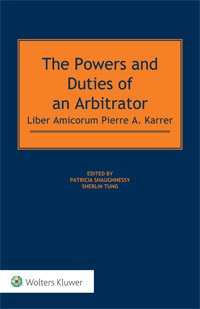Inspired by Dr. Karrer’s interest in and his advocacy of a strong arbitrator role, as evidenced in his lectures, presentations and publications as well as in his role as an arbitrator, the contributions in this book consider questions such as the following:
- What are the sources of an arbitrator’s power?
- What are the limits of an arbitrator’s power?
- Should arbitrators have a role in encouraging settlement?
- May arbitrators regulate and impose sanctions against counsel?
- How managerial should arbitrators be?
- What are the duties and liabilities of arbitrators?
- What is the nature of the arbitrators’ relationship with arbitral institutions?
- Are emergency arbitrators actually “arbitrators”?
- Should arbitrators raise issues of arbitrability and public policy ex officio?
- To what extent may arbitrators delegate tasks and use tribunal secretaries?
Edited by Patricia Shaughnessy, Sherlin Tung
|
The Powers and Duties of an Arbitrator focuses on powers and duties of arbitrators in arbitration proceedings, a topic which has been widely discussed in recent years, but remains understudied. Among prominent international arbitrators, Dr. Pierre A. Karrer stands out as exemplifying and advocating the responsible exercise of powers to fulfil the duties of an arbitrator. At a time when arbitration is under ever greater scrutiny and subject to ever more searching and sometimes hostile enquiries, Dr. Karrer’s work provides an example of how good the arbitral process can be when it is in the hands of a master. This book adds to the substantial contributions resulting from Dr. Karrer’s career. More than thirty leading arbitration practitioners and academics worldwide who have been a part of, and have been influenced by, Dr. Karrer’s extensive professional career have contributed to this book celebrating Dr. Karrer’s career on the occasion of his seventy-fifth birthday. Inspired by Dr. Karrer’s interest in and his advocacy of a strong arbitrator role, as evidenced in his lectures, presentations and publications as well as in his role as an arbitrator, the contributions in this book consider questions such as the following:
The extensive range and high standard of the contributions in this book, as well as the diversity and prominence of its contributors are a testament to the esteem and affection in which Dr. Karrer’s held. The contributors to this book celebrate Dr. Karrer’s influence in the arbitration field and join in his commitment to improving the practice of arbitration. With an ever increasing global growth in the international arbitration community, this book offers an abundance of thought-provoking yet practical commentary and guidance for practitioners, academics and students in the field of international arbitration and international commercial law, allowing them to also stay “up to date” in these fields.The contents of this book address and provide an extensive analysis of some of the most discussed and debated “hot issues” in arbitration today. Read more and view table of contents. |




